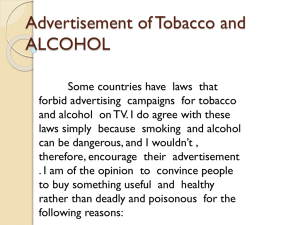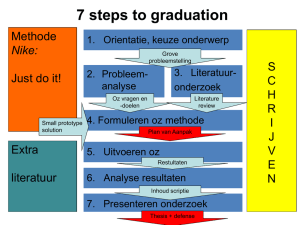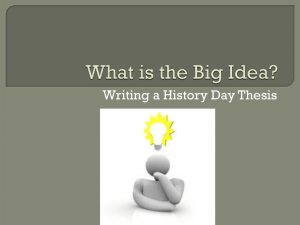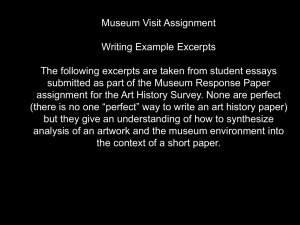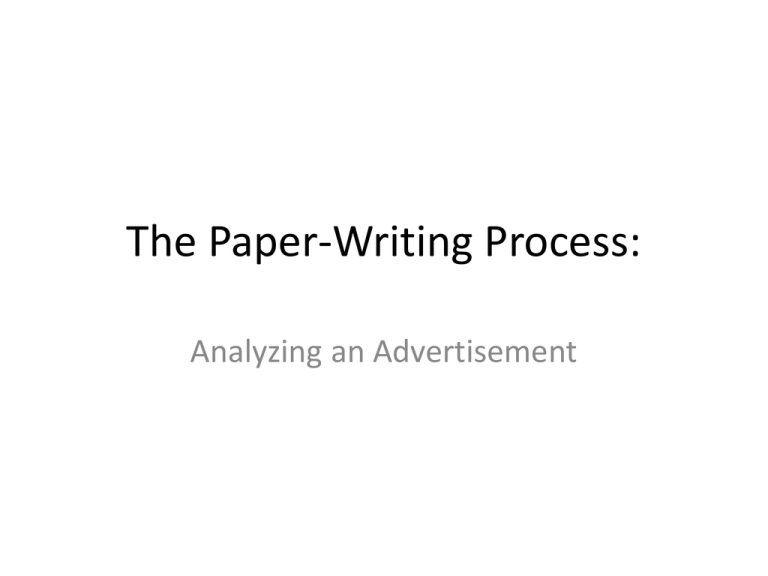
The Paper-Writing Process:
Analyzing an Advertisement
Selecting an Ideal Advertisement
• First, peruse several magazines, looking for
advertisements that really make you stop and
take notice.
– Sometimes simplicity grabs your attention.
– Other times, an edgy quality makes an ad stand
out.
– Themes that are controversial or make viewers
uncomfortable also make for good ads to analyze.
The Advertisement for This Paper
• This is the advertisement I’ve selected for this
paper-writing process demonstration.
• Simon G. Advertisement. Elle. September
2011: 231.
• Here is a picture of the original advertisement:
Simon G. Advertisement
Freewriting and Brainstorming
• Once you’ve selected an advertisement to
analyze, actually set a timer for 5-10 minutes,
and freewrite about your ad.
• Freewriting not only helps you determine
whether this ad would prove a fruitful one to
analyze, but it also helps you generate actual
paper ideas.
Freewriting
• Remember that freewriting means to write
without stopping—literally without lifting your
pen off the paper or ceasing to type on the
computer—for the entire time allotted.
• Even if you end up writing nonsense (“I’m hungry,
I’m hungry; I want pizza now.”) or unrelated
things (“I wonder what time my dentist
appointment is next week.”), the goal is to keep
writing. Always keep writing.
• Here is an excerpt from my freewriting:
Freewriting for Simon G. Ad
•
“The first thing I notice is that this ad is super-simple. Part of me wonders if I’d
have enough to write about. The page is mainly black and bronze, with three rings
in the center. Maybe the background is not black—is it just a really dark brown?
Like the center, lit-up part faded into darknes?. What are the rings sitting on? Is
that wood, or stone? I think it’s stone. I don’t know what kind. Stone is cold.
Usually jewelry is displayed on black velvet. Three rings. Three is my favorite
number. There are lots of threes in our culture: the Holy Trinity. A threesome.
Three wishes. I grant you three wishes. Three strikes, and you’re out! Third time’s
the charm. Simon G. Simon says. Simon sez. Simon, simon, went to the pie man.
Simon. Simon. Why Simon G.? Simon G.—yes, it’s the name of the company, but
the gift tag is signed “Simon G.” Including the last initial shows a lack of
familiarity—who needs to sign his last initial when giving a diamond ring? Simon.
Sounds British. Hang tag. Gift tag. ? It looks like an old-fashioned price tag. It’s
polite to cover up the price tag when you give a gift. Who would purposefully
leave the price on a gift? Someone who wanted you to know how much they paid
for it. The rings are all the same. Well, no they’re not—some of the stones are
different colors. I haven’t ever even heard of Simon G. Is it an online store?”
Brainstorming
• Brainstorming consists of quickly writing a list
of words and phrases that occur to you.
• In this case, you’ll keep your ad in front of you
and start listing whatever pops into your
mind.
• Just like freewriting, the objective is to keep
listing items for the entire time, even if the
ideas don’t seem to contribute to your topic.
Brainstorming for Simon G. Ad
•
•
•
•
•
•
•
•
•
•
•
•
•
•
•
•
Black
Bronze
Glowy light
3 rings, 3 colors
Diamonds
Shiny, sparkly
Spotlight
Hang tag
Talks about sex
Guilt gifts
Honey, I’m sorry
Not engagement rings
Kind of heavy, masculine design
Website, Facebook
Why Simon G.? Why not Diamonds R Us?
Super-simple ad
•
•
•
•
•
•
•
•
•
•
•
•
•
Company name
Easy-to-read script
Dangling tag
3 rings
Ring colors: yellow, pink, clear
Pink = watered-down red
Red = stop
Pink = slow down, maybe? Not a TRUE stop.
Yellow = caution
Clear = white = pure
Pure = the original commitment the ring
symbolizes
Pure one is on the bottom—it’s LAST
No “TO,” on the tag--Like calling all women
“honey-- just in case wife sees gift
accidentally.
Writing the Thesis
• After you’ve thought and written about your
advertisement for a while, you’ll likely
formulate some ideas for your thesis—a
central theory that you will prove about this
ad.
• It’s best to write several thesis statements, so
that you have a few to pick from or revise.
• Creating the best thesis statement possible
helps focus your writing.
Writing the Thesis
• Thesis statements must encompass both your
topic and your take on or stance on or argument
about that topic.
• Good thesis statements are targeted and specific.
Sometimes students write vague or broad theses,
worried that they won’t meet the paper’s length
requirement with a concise one, but the best
papers develop a narrowly focused thesis.
• Good thesis statements are super-clear for
readers.
Writing the Thesis
• Here are 4 potential thesis statements for an analysis of the Simon
G. ad:
• 1. This Simon G. advertisement tells men that if they make a
relationship mistake, they can earn forgiveness by purchasing
jewelry.
• 2. Simon G.’s advertisement for diamond rings reinforces the idea
that women are gold diggers, and prefer money to sex.
• 3. What Simon G. is really telling consumers is that women are
stupid, gullible, and easily manipulated by men whose major
motivation is to get away with bedding lots of women.
• 4. This Simon G. advertisement undermines male-female
relationships by devaluing honesty and human connection.
• You’ll see in the final draft that I ended up combining ideas from
several of these thesis statement rough drafts.
Developing the Thesis and
Writing an Outline
• I chose the third thesis as my working thesis. This
means that I’ll use it to draft my paper, but I have
the freedom to change it later.
• The next step is to write a paper outline. The
outline will consist of the thesis statement, plus
topic sentences for every body paragraph.
• Topic sentences are very clear statements that
open each body paragraph. They each present
one reason why your thesis is valid.
Writing an Outline
• Here is my outline for the ad analysis paper, consisting of
my thesis statement and topic sentences:
– What Simon G. is really telling consumers is that women are
stupid, gullible, and easily manipulated by men whose major
motivation is to get away with bedding lots of women. What
starts out as a simple jewelry advertisement ends up
undermining everything that is good and wholesome and
desirable about romantic relationships.
• This advertisement undermines romantic relationships by suggesting
that women are stupid and gullible, and men are anti-intimacy.
• The colors of the rings depicted are also telling: they are indicators of
how Simon G. thinks men should view and handle romantic
entanglements.
• The last way that Simon G. degrades women and undermines loyal,
loving romantic relationships is through the symbolism of the number
three.
Writing the Introduction
• Once you have a clear, focused thesis statement,
and you’ve written at least 3 topic sentences
which support that thesis, it’s time to write your
introduction.
• Remember that an introduction consists of 4
parts:
–
–
–
–
Attention-Getter
Background Information
Thesis Statement
Statement of Parts
Writing the Introduction
•
Here is my complete introduction for the advertisement analysis paper:
•
“In 2003, NBA superstar Kobe Bryant was caught in a sex scandal, with initial allegations of forced
sex on the accuser’s part, and ultimate admissions of adultery on Bryant’s (“Kobe Bryant Charged”
par.1; “Kobe Bryant Rape” par.3). The questionably regretful Bryant (was he truly sorry, or just sorry
he had been caught?) held a press conference with his distraught wife by his side, and apologized
for his marital wrongdoings. Mrs. Bryant, looking the part of the tear-stained wife, sported on the
fourth finger of her right hand a brand-new diamond ring that reportedly cost the superstar $4
million (Mimon par.4). A $4 million apology may seem steep to everyday folk, but it would likely be
a mere drop in the proverbial bucket for a sports hero of Bryant’s stature. Plus, when it comes to
getting out of serious trouble, people of all ilk are willing to go to extreme lengths. So hopes Simon
G., purveyors of diamond rings. At first glance, Simon G.’s fall 2011 advertisement seems simple:
three sparkly women’s rings, plus a light sex joke, and they have managed to appeal to both men
and women. Looking deeper, however, it becomes apparent that every real message of this
advertisement is subtle and subconscious: what Simon G. is really telling consumers is that women
are stupid, gullible, and easily manipulated by men whose major motivation is to get away with
bedding lots of women. What starts out as a simple jewelry advertisement ends up undermining
everything that is good and wholesome and desirable about romantic relationships.”
Transitioning from the
Introduction to the Body
•
•
•
Transition smoothly between all paragraphs.
Transitions belong at the start of new paragraphs, not at the end of old ones.
Transition into the body paragraph’s topic sentence, which is the first sentence of
the first body paragraph. In the sample paper, I describe the advertisement in a
separate paragraph, the last sentence of which appears below, then move into my
first proof paragraph like this:
•
“ . . . At the bottom of the page, the company’s Website and Facebook address are
listed.
Appearing at the top of the page, “Simon G.” makes sense, for it is the company
name. Where “Simon G.” appears again, though, may give the viewer pause.”
•
•
Notice that it made sense to transition from a description of the advertisement
into a paragraph that begins by still talking about text and image placement within
the ad.
Developing Body Paragraphs
•
•
•
After presenting your topic sentence, go on to prove it, and by extension your thesis, by offering plenty
support: use plenty of your own explanations, examples, statistics, anecdotes, case studies , and anything
else that works to prove your theory.
Body paragraphs are the place to insert your outside research, but note that your paper should be 90+%
you and your ideas, lightly supported by outside research. Here is an example of how to insert an outside
quote with proper MLA documentation. Remember that all outside sources must be worked smoothly
into your own writing. Quotes cannot stand alone.
•
At first glance, one may assume that these three choices are designed to satisfy the varying tastes of
different committed partners, but the more subversive suggestion may be equally true: these three
different rings represent three different women men may enjoy having in their lives, catering to the
sexual variety that men supposedly crave. According to clinical psychologist Craig Benson, “men
report a high and consistent desire to have multiple partners to avoid boredom” (77). In most of
popular culture aimed at more monogamously minded women, advertisements display a single
engagement ring, representing an enduring commitment to a single man. This advertisement
avoids offending such women by subtly, and thus more effectively, suggesting not marriage, for the
rings pictured are decidedly not engagement rings, and not one gift for one woman, but multiple
gifts for the multiple women that men reportedly desire. Thus this Simon G. advertisement pushes
the alternative to conventional, singular, monogamous partnerships.
This paragraph is primarily full of the writer’s ideas, very lightly supported by outside research.
Continuing Body Paragraphs
• Continue on with your body paragraphs,
presenting as many as needed to solidly build
your case and prove your thesis.
• Remember to always transition smoothly
between paragraphs, place those transitions
at the outset of the new paragraphs, and
begin each body paragraph with a topic
sentence—a reason why your thesis is true.
The Conclusion
• After you’ve completely proven your thesis with
your full body paragraphs, transition to your
conclusion.
• The conclusion is a mirror of the introduction,
and as such, it should contain a similar set of
ingredients:
– Restatement of your main proof points
– Restatement of your thesis
– Presentation of a strong, solid, thought-provoking,
final-sounding end note.
The Conclusion
• Here is the conclusion to the analysis of the Simon G.
advertisement:
• “Simon G. has secured an advertising coup, at once
being subtle and sparkly enough to appeal to the
presumably airheaded women it is hoping half the
population is, while casting a knowing look above
these damsels’ bowed heads, so intent are they upon
studying what they hope will become their rings, at the
men who Simon G. is giving a virtual fist-bump to,
appealing to their vanity, their self-confidence, and
their swagger, promising them tips and support in their
quest to live large, with many women in their lives at
all times, and a reliable two in their beds.”
The Full Sample Paper
• You can read the entire sample paper here,
complete with the Works Cited page:
• 1121 Sample Simon G Ad Analysis Essay.docx





